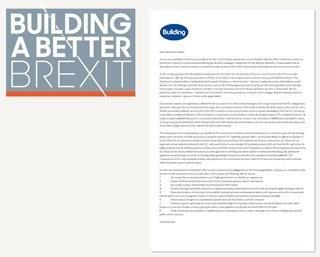Now that the election is over, a new parliament will convene. But are the incoming crop of MPs fully aware of how important the construction industry is for the UK economy? Here’s your chance to ask them to put the built environment at the heart of building a better Brexit

Since 18 April, when Theresa May surprised the country with her announcement of the snap general election, the political parties have set out, to varying degrees, their positions on key construction issues. The three main parties were invited to address our readers directly, an opportunity taken up by the Labour Party and the Liberal Democrats in their open letters, published last week.
The result of the election is finally known today and those now in charge – whatever government is formed from the hung parliament – will face the biggest challenge to the UK economy in generations: negotiating a successful exit of the European Union. Meanwhile, 650 MPs – some returning, some new – will be joining parliament; and how much – or little – they understand about the construction sector will be crucial to how much the industry is considered when it comes to future policy.
As soon as Article 50 was triggered on 29 March this year, the Brexit negotiators were counting down on a two-year timeframe to secure a deal with the EU. They will have to tackle two central issues that will affect the construction industry’s prospects for future growth: immigration and trade. The consequences for the industry of a bad deal on either of these fronts could be spiralling costs and plummeting output.
This is where the role of your new local MP could be crucial. He or she may not be able to have much of a say over the final Brexit deal presented to parliament, given that the House of Commons has only been granted a “take it or leave it” vote on the deal (meaning if MPs do not like the proposal, the government would simply leave the EU with no deal).
However, members of parliament can still raise matters in the House of Commons on behalf of construction businesses in their constituencies, participate in key debates that affect the industry, be part of parliamentary committees that probe government policy and help to raise the profile of the industry by supporting campaigns like our own Building a Better Brexit initiative.
Opportunities for growth
It is therefore vital that this new cohort of MPs understands what the construction industry contributes to the economy as a whole and the role it plays in driving growth in their own local areas. Some of these critical projects may be obvious – such as the proposed expansion of Heathrow airport or the less-than-secure Crossrail 2 project, both of which are very much in the public eye.
Others have perhaps less of a public profile, such as off-site manufacturing facilities, which at the moment only account for 10% of construction output but which are widely predicted to become a major source of employment in the near future.
Already, Heathrow has announced plans to set up four off-site manufacturing hubs, which it has proposed sharing with other key infrastructure projects such as HS2 and Hinkley as well as housing developments.
Mark Farmer, founder of consultant Cast and author of the Modernise or Die report, is convinced that off-site manufacture is a “platform for growth”. He points to business opportunities being created by the Constellation Partnership, formerly the Northern Gateway Development Zone. This body, which covers areas such as Crewe, Stoke and Chester, is specifically looking at how off-site manufacturing will enable the region to become an export base for the rest of the country.
Civic leadership is going to be increasingly important if elements of the Industrial Strategy are going to be played out
Mark Farmer, founder, Cast
Farmer says politicians are key to initiatives like this: “Civic leadership is going to be increasingly important if elements of the Industrial Strategy are going to be played out.”
The problem is that not all political leaders understand off-site manufacturing. Farmer says: “Some are still fettered by old perceptions of what prefabrication means, they still see it as poor quality […] Others are advocates of the emerging sector at a time when other industries are on the decline. It’s definitely an opportunity to get them on the same page.”
This week, as the country was on the verge of finding out which political campaign has come out on top in the polls, we asked a panel of industry leaders to put forward their first priorities for the next administration. Their responses reveal that the prospect of Brexit has brought renewed urgency to familiar concerns such as addressing the skills crisis and investing in the country’s infrastructure.
It is clearly in the interests of construction that more and more industry professionals seek to highlight such concerns and in doing so take the time to educate the public and politicians about the modern realities of the construction industry.

For too long, the sector’s image problem has held it back in terms of attracting much-needed recruits and investment. Now is a chance for readers to showcase the best of the industry and to explain how modern 21st-century techniques can be used to deliver crucial infrastructure, housing, schools and hospitals all around the UK.
So as part of our Building a Better Brexit campaign, we are calling on readers to tell our newly elected MPs what this government’s most pressing priorities should be.
Attached, we have drafted a general letter to MPs. But we want you to adapt it and add your own story that reflects your business and your local area. This is a powerful way to highlight the risks as well as the opportunities posed by Brexit. It is your chance to add your voice to construction’s message and take it directly to your local representative in parliament.
Write to your MP
You can download this model letter to your MP by clicking here.
As part of our Building a Better Brexit campaign, we are calling on readers to tell our newly elected MPs what this government’s most pressing priorities should be.
We want you to adapt it and add your own story that reflects your business and your local area. It is your chance to add your voice to construction’s message and take it directly to your representative in parliament.
Stimulate confidence

Now we have the result of the general election, I hope there will be a period of stability with the formulation of a 10- to 15-year plan to provide consistent workflow for our industry. This, in turn, needs to stimulate the confidence that has been so lacking, allowing there to be a programme of quality training and enhanced investment in a future generation of workers and the technology they require to develop our industry into the 21st century. Key touchstones for immediate attention are housebuilding and guarantees of funding for infrastructure projects that affect road, rail and air travel. What we do not need is a government with a one-item agenda solely focused on haggling with an alienated EU who appear to be increasingly viewing the UK as intransigent and unreasonable. Unfortunately, as was once said in another context, I fear this is not the end, or even the beginning of the end. This election result is more like the end of the beginning.
Richard Steer, chairman, Gleeds Worldwide
Tackle the skills deficit

Having a sufficient number of skilled construction workers will be essential to delivering the ambitious housing and infrastructure projects set out in both the Labour and Conservative Party manifestos. And what’s clear from the evidence coming out of the industry is that we are nowhere near that number. Whichever party has won, we will need a two-pronged approach to tackling the huge skills deficit we face. In the short term, we will need a pragmatic and flexible attitude towards immigration. EU labour has come to form a significant part of our sector’s workforce. Given the current labour market, it’s likely that this reliance will continue for some time yet. This means first that we need to guarantee the rights of those EU workers already working here as a matter of urgency; and second, we need a post-Brexit immigration system that’s flexible enough to continue to allow key strategic industries like construction to access sufficient levels of EU workers. The longer-term solution is to attract, recruit and train far more UK workers. To do this, the next government needs to set a framework that allows construction industry employers to increase the quantity and quality of apprenticeship training. If we fail to increase the quality of apprenticeship standards across the board, construction’s SMEs will be deterred from engaging with apprenticeship training.
Sarah McMonagle, director of external affairs, Federation of Master Builders
Secure rights of EU nationals

This election came at a critical time for the construction sector. While it is clear that Brexit is high up on the agenda, the UK government will have received a clear signal that people across the UK are just as concerned about quality of life. The quality of the places in which we live, work and play will be a real reflection of the ambition and success of the new government in the coming months and years. The UK’s architects are among the best in the world, and we want to work with the government to ensure that this success can continue. The RIBA continues to call for the rights of non-UK EU nationals currently in the UK, and UK citizens in the EU to be secured as quickly as possible. Over the long term, supporting the sector will mean ensuring that we can access the global talent and skills that make our practices so innovative. On the home front, we need to ensure that the wide-ranging expertise of architects are best utilised so that we can meet the demand for high-quality sustainable housing, infrastructure and public buildings. Such professional expertise can complement the ongoing agenda for devolution, ensuring that public bodies and industry can create a built environment legacy that supports and has support from communities.
Jane Duncan, president, RIBA
A clear pipeline of work

The past four years of consecutive growth for the construction industry demonstrates a resilient sector that has been able to shake off rising costs and political uncertainty. That said, the industry needs government – the largest client of UK construction – as a fully-engaged partner at this crucial time. Last year government procurement represented a third of annual construction output, about £35bn. For this reason, we would ask government to roll out its balanced scorecard approach to all of its own construction procurement. Factoring in guidance around themes such as environmental sustainability and supply chain management would safeguard UK suppliers competing on a level playing field and ensure government gets best value though the innovation of UK manufacturers. We must also be focused on projects in the National Infrastructure and Construction Pipeline and how these will feed through to delivery on the ground. An enhanced pipeline would allow industry to be more forward-looking, which could incentivise large-scale investment. Third, government must commit to an industrial strategy; in particular we would like to see a sector deal for the construction industry. They must consult with the entire supply chain to shape this deal.
Dr Diana Montgomery, chief executive, Construction Products Association
Expand infrastructure spending

This is a pivotal moment for the UK’s construction industry. This next government and its industrial strategy will shape our economy as we leave the EU. Without hyperbole, it is the most significant political challenge this country has faced in generations. For me, the most pressing issue will be to ensure the construction industry has access to the people and talent we need to keep delivering sustainable growth and development. That priority should shape the Brexit talks and hopefully drive more investment into equipping our workers with the key skills they need. We also need to keep pressing for more regional connectivity to ensure that the whole of the UK is able to keep growing. Infrastructure spending needs to be maintained or expanded, and the money needs to be directed where it will have the biggest impact. This doesn’t just mean just rail and aviation projects; Brexit will mean our ports need to see big investment in the short to medium term.
Mark Castle, deputy chief operating officer, Mace





























No comments yet